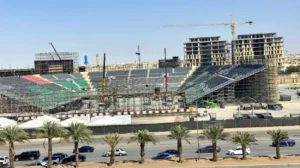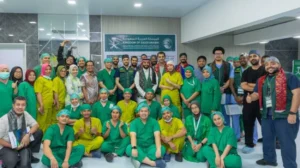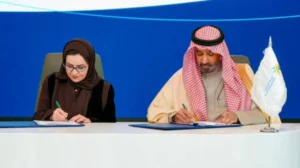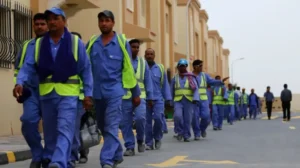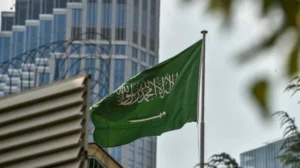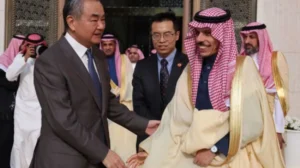- Home
- Why Boycott?
- Human Rights Violations
- Migrant Workers Exploitation & Kafala System Abuse
- Saudi Arabia’s War Crimes
- Freedom of Press and media censorship
- Torture And Unfair Trials
- Saudi Arabia’s Anti-Climate Agenda
- Bogus Stadium Infrastructure
- Sportwashing & Political image
- Saudi Arabia’s Unfair bidding Process
- FIFIA Corruption and Transparency issues
- Poor Treatment of LGBTQ community
- Security risks for spectators
- News
- Get Involved
- Contact Us
Migrant Workers Exploitation
FIFA World Cup 2034: The Dark Reality of Migrant Labor Exploitation in Saudi Arabia
Saudi Arabia’s hosting of the FIFA World Cup 2034 has been controversial and internationally discussed. One of the most urgent issues is the long history of exploitation of migrant labor in the country. It calls into serious question the ethics of its suitability to host such a grand world event. Human rights groups, governments, and former FIFA executive members even have all roundly slammed the treatment of foreign laborers in Saudi Arabia. There are a lot of reasons why Saudi Arabia doesn’t seem to be the right choice for hosting a big event like the FIFA World Cup 2034. Here are the reasons why boycott the Saudi 2034 FIFA World Cup. Let’s talk about in detail:
1. Widespread Forced Labor and Human Rights Violations
The Kafala (sponsorship) system of Saudi Arabia helps to account for its exceptionally high rates of forced labor in the Middle East. Migrant workers under this system have very few rights and little control over their employment and housing status, which results in serious abuse.
- The International Labour Organization (ILO) reports more than 3.8 million migrant workers in Saudi Arabia under cruel labor circumstances. It is majorly due to the Kafala System.
- A Human Rights Watch (HRW) analysis from 2021 discovered that many thousands of people suffer from wage theft, contract manipulation, and physical violence.
- Companies that steal passports and threaten expulsion keep many people stuck in work that they can’t quit. Human rights violations are a common practice.
- Allowing Saudi Arabia to host the World Cup would probably mean thousands more migrant workers under the same exploitative circumstances will be brought in to construct roads, hotels, and stadiums.
2. Horrible living conditions for migrant workers
Many foreign workers in Saudi Arabia reside in unsanitary, hazardous, and substandard housing. Notwithstanding assurances of good living conditions, companies usually offer poor accommodations. Saudi Arabia is violating human rights and there is no way back.
- An Amnesty International study from 2023 determined that more than 60% of migrant workers reside in overcrowded compounds with substandard sanitation and subpar access to purified drinking water.
- The Saudi administration in 2020 forcibly removed thousands of employees from their homes during the COVID-19 epidemic, leaving them homeless and unemployed.
- Migrant worker organizations’ studies point to regular disease outbreaks including ones like tuberculosis and dengue fever in labor camps.
- Such circumstances are unsuitable for any employee, let alone for personnel readying the infrastructure of a great worldwide function.
3. High Death Toll of Migrant Workers in Construction Projects
Among the most worrying features of migrant worker abuse in Saudi Arabia is the high mortality in construction sites. Following the deaths of hundreds of workers in Qatar’s 2022 FIFA World Cup preparations, this problem received much worldwide coverage.
- Since 2010, Migrant-Rights.org 2022 report puts the number of deaths in Saudi Arabia caused by dangerous working conditions above 10,000.
- The International Trade Union Confederation (ITUC) estimates that every year in Saudi Arabia’s construction sector at least 200 people perish from heat stress and work accidents.
- The New York Times inquiry found in 2019 that several worker fatalities go unrecorded since officials frequently blame “natural causes” rather than on-the-job incidents.
- Knowing this past, there is little reason to think Saudi Arabia will provide worker safety in the construction of World Cup venues.
4. Long hours of work but no fair compensation
Many migrants in Saudi Arabia have to work very long hours without decent pay. Here are some claims to support this reason:
- The ILO claims that most migrant employees in Saudi Arabia that they work 12-16 hours daily without overtime pay, well over 48 hours weekly statutory limit.
- A report from HRW 2023 found that domestic workers, construction workers, and factory staff commonly work up to 18 hours daily with no breaks.
- By seldom enforcing labor rules, Saudi authorities let companies subject employees to tough working hours with nearly no legal consequences.
- This degree of exploitation does not match the ethical norms a World Cup host country is supposed to hold.
5. Rampant Wage Theft and Unpaid Salaries
Among the most prevalent forms of exploitation encountered by offshore workers in Saudi Arabia is wage theft. Sometimes never pay at all, and businesses often hold wages for months on end.
- Migrant workers in Saudi Arabia have experienced wage theft over 45 percent, according to a 2022 International Trade Union Confederation study.
- Over several months in 2021, many Bangladeshi and Indian employees staged demonstrations demanding their wages.
- A BBC inquiry revealed that several employees face deportation unless they volunteer to keep working.
- FIFA stresses fair play and justice—values that Saudi Arabia ignores in its treatment of employees. Accordingly, this country doesn’t deserve to be the host.
6. Sexual and Physical Abuse of Migrant Workers
Especially among domestic workers, many female migrant workers experience severe physical and sexual violence in Saudi Arabia.
- Amnesty International discovered in a 2019 report that 68% of female domestic workers from the Philippines and Indonesia disclosed their employer’s physical or sexual assault.
- Sparkling worldwide indignation, a viral instance from 2018 featured an Ethiopian domestic worker who was beaten to death by her employer.
- According to the U.S., Saudi Arabia is among the worst countries for human trafficking; many women are also victims of forced labor and trafficking. 2023 Human Trafficking in Persons Report from State Department.
Saudi Arabia’s historical record of gender-based violence in Labour markets makes it an unsuitable venue for a worldwide sports event designed to reflect unity and equality.
7. Absence of legal protection for migrant workers
Saudi Arabia has not provided significant safeguards for foreign labor although they have promised labor reforms.
- The changes to the Kafala system of 2020 were mostly cosmetic; migrant labor still needs permission from employers to switch jobs.
- The Global Slavery Index says Saudi Arabia is still among the most serious forced labor and modern slavery perpetrators.
- Frequently disregarding employee grievances, the Saudi Ministry of Labor enables abuse to run rampant.
- A nation that does not honor fundamental labor rights should not be given an event as famous as the World Cup.
8. Mass Deportations and Arbitrary Detentions of Migrant Workers
Sometimes under harsh circumstances, Saudi Arabia has a past of wholesale expulsions and imprisonments of overseas labor.
- Al Jazeera reports that Saudi Arabia deported more than 250,000 illegal migrant laborers in 2021.
- In a 2022 HRW report, terrible situations in detention facilities where thousands of Ethiopian and Yemeni laborers were kept in tightly packed cells lacking enough food or water were noted.
- Many prisoners perish from lack of food, beating, and illness in Saudi jails, Amnesty International says.
- Workers’ unfair detention and abuse violate FIFA’s goal of advancing worldwide inclusion and human dignity.
9. Migrant Worker Discrimination and Racism
Particularly towards slave labor, Saudi Arabia has a long history of bigotry and prejudice against immigrant people from South Asia and Africa.
- A 2019 Gulf Labor Rights Initiative poll found that 82 percent of African migrant laborers said they were subjected to racial discrimination at work.
- Many employees are separated from Saudi nationals and encounter racial assaults in public areas.
- For the same employment, foreign employees make much less than Saudi nationals, with no means of redressing wage inequalities.
- A nation that institutionalizes racism should not be permitted to organize the planet’s most all-encompassing sports event.
10. Lack of Press Freedom and Worker Advocacy
With strict media censorship in Saudi Arabia, it is practically impossible for journalists or advocacy organizations to uncover worker abuses.
- Reporters Without Borders rates Saudi Arabia 170th of 180 nations in terms of press freedom.
- Many people working to reveal immigrant worker abuses run for arrests and lengthy jail times.
- Union formation or strikes for better conditions are prohibited at work.
- The international community cannot depend on Saudi Arabia to fairly handle World Cup labor if there are no civil rights or labor rights.
11. FIFA Corruption: The Dark Side of Global Football
Having the 2015 inquiry uncovered bribery plans with more than 30 members, FIFA has suffered serious corruption scandals. US World Cup hosting rights were connected to corrupt transactions for which the Department of Justice clawed back more than $201 million.
Part of Saudi Arabia in FIFA’s corruption
- The 2034 World Cup was chosen for Saudi Arabia within 27 days, causing worries about the absence of openness. Critics argue that Saudi Arabia’s close associations with FIFA leadership and enormous financial resources might have affected the process.
Public Distrust of FIFA’s Actions
- A 2022 poll discovered that 78% of Spanish soccer supporters thought FIFA had been corrupt in recent years, therefore showing worldwide doubt regarding the organization’s policies.
12. Exploitation of Migrant Workers: Labor Abuses
With about 740,000 people working under slavery-defined conditions, Saudi Arabia has the most modern slavery of any Arab country. Many of these employees suffer unsafe working conditions as well as passport confiscation and wage theft.
Labor rights Misuses
- With more than 6,500 migrant worker deaths seen in Qatar’s 2022 World Cup, concerns abound that Saudi Arabia could repeat or even exceed these atrocities. Major development projects are likely to depend on abused workers; human rights organizations say.
Government crackdown on activists advocating for labor rights
- Saudi officials have arrested and kept employees who demonstrated unpaid wages, underlining once more the absence of Labour protection in the country.
13. Sportswashing: Using Sports to Cover Up Reputation
Billions of dollars have been spent by the Saudi government on sporting events like LIV Golf and the Newcastle United acquisition to divert attention from abuses of human rights. Their brutality would be yet more glossed over by holding the World Cup.
Torture and Unjust Legal System
- Activists in Saudi Arabia are still under arrest for their nonviolent protests. For tweets advocating women’s rights, Saudi PhD student Salma al-Shehab was given a 34-year prison sentence.
Free speech crackdown
- Government critics run the risk of arbitrary detentions, torture, and even capital punishment. Organizing a world tournament in a nation with such terrible human rights abuses runs against FIFA’s pledge to equality and fairness.
14. War Crimes: Violations of International Law
The Saudi-led coalition in Yemen has been charged with carrying war crimes, with Saudi bombings responsible for 60% of all civilian fatalities. Many civilians are amongst the over 377,000 dead in the war.
Targeting Hospitals and Schools
- Human rights groups say Saudi troops have purposely pulverized schools, hospitals, and refugee camps, thus breaking international humanitarian law.
Weapons sales and worldwide condemnation
- Despite the worldwide protests, Saudi Arabia still gets arms from Western nations hence reviving more conflict. Letting a nation like this one host the World Cup is a risk of legitimizing its involvement in war crimes.
15. Torture and Unfair Trials: A Violation of Justice
Being well-known for torture, indiscriminate detentions, and seriously poor trials, Saudi Arabia would not be an ideal location for the FIFA World Cup 2034 given their judicial system. A country that constantly breaks human rights flies in the face of FIFA’s ideals of fair play, justice, and inclusivity.
Common Widespread Use of Physical Violence
- Human Rights Watch says that 72% of Saudi Arabian political inmates suffer electric shocks, beatings, and lengthy solitary isolation to coerce confessions.
- UN studies back up that Saudi security experts torture 80% of political cases, including journalists, activists, and dissenters.
- Loujain al-Hathloul, a women’s rights campaigner, was held and tormented for over 1,000 days—including waterboarding and sexual abuse—simply for supporting women’s right to drive.
Unjust trials and severe penalties
- The European Saudi Organization for Human Rights says Saudi courts find 90% of accused guilty in closed hearings.
- Saudi PhD candidate Salma al-Shehab received a 34-year jail sentence for supporting women’s rights in tweets.
- Many of the 81 individuals put to death by the Saudi government on one day in 2022 were found guilty in bogus trials grounded on coerced confessions.
Why FIFA Should rethink giving the World Cup 2034 hosting rights to Saudi Arabia?
Given Saudi Arabia’s organized abuse of migrant workers, it should be disqualified from holding the 2034 FIFA World Cup. The international community must hold FIFA responsible for making sure that host countries respect labor rights and human rights. Should Saudi Arabia not implement major labor changes, the earth has to rethink its suitability for hosting the most important soccer event. Boycott the Saudi 2034 FIFA World Cup Always!

